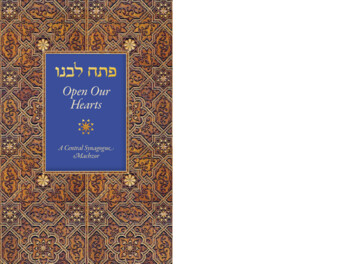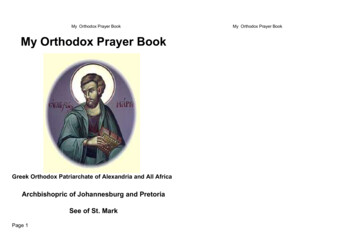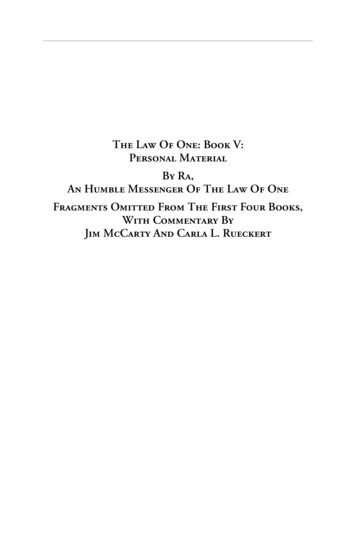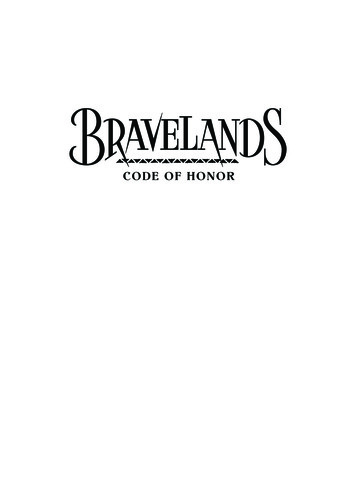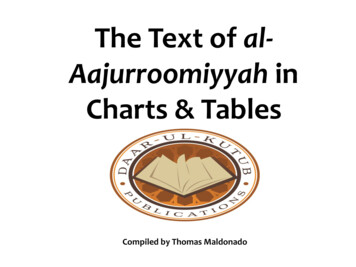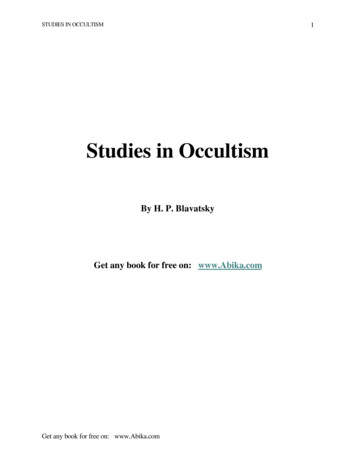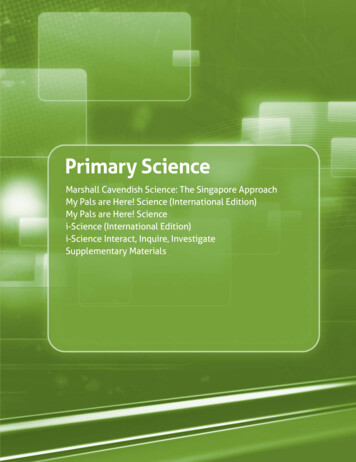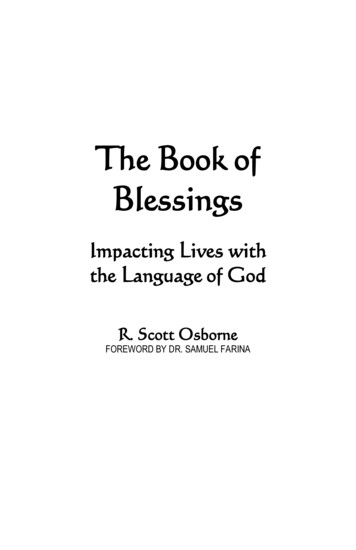
Transcription
The Book ofBlessingsImpacting Lives withthe Language of GodR. Scott OsborneFOREWORD BY DR. SAMUEL FARINA
Copyright 2007 by R. Scott OsborneThe Book of Blessings by R. Scott OsbornePrinted in the United States of AmericaISBN 978-1-60266-744-0All rights reserved solely by the author. The author guarantees all contents are original anddo not infringe upon the legal rights of any other person or work. No part of this book maybe reproduced in any form without the permission of the author. The views expressed in thisbook are not necessarily those of the publisher.Unless otherwise indicated, Bible quotations are taken from The King James Version of theHoly Bible (also known as the Authorized Version). This translation of the Holy Bible is inthe Public Domain.Scripture quotations marked “CJB” are taken from the Complete Jewish Bible, copyright 1998 by David H. Stern. Published by Jewish New Testament Publications, Inc.www.messianicjewish.net/jntp. Distributed by Messianic Jewish Resources.www.messianicjewish.net. All rights reserved. Used by permission.Quotations marked “KJV” are taken from The King James Version of the Holy Bible (alsoknown as the Authorized Version). This translation of the Holy Bible is in the PublicDomain.Scripture quotations marked “NASB” are taken from the New American Standard Bible ,Copyright 1960, 1962, 1963, 1968, 1971, 1972, 1973, 1975, 1977, 1995 by The LockmanFoundation. Used by permission (www.Lockman.org)Scripture quotations marked "NCV" are taken from the New Century Version . Copyright 2005 by Thomas Nelson, Inc. Used by permission. All rights reserved.Scripture quotations marked “NIV” are taken from the HOLY BIBLE, NEWINTERNATIONAL VERSION . NIV . Copyright 1973, 1978, 1984 by International BibleSociety. Used by permission of Zondervan. All rights reserved.Scripture quotations marked “NIrV” are taken from the HOLY BIBLE, NEWINTERNATIONAL READER’S VERSION . NIV . Copyright 1994, 1996 by InternationalBible Society. Used by permission of Zondervan. All rights reserved.Scripture quotations marked "NKJV" are taken from the New King James Version .Copyright 1982 by Thomas Nelson, Inc. Used by permission. All rights reserved.Scripture quotations marked “NLT” are taken from the Holy Bible, New Living Translation,copyright 1996. Used by permission of Tyndale House Publishers, Inc, Wheaton, Illinois60189. All rights reserved.Scripture quotations marked “RSV” are taken from the Revised Standard Version of theBible, copyright 1952 [2nd edition, 1971] by the Division of Christian Education of theNational Council of the Churches of Christ in the United States of America. Used bypermission. All rights reserved.Scripture quotations marked “TNIV” are taken from the HOLY BIBLE, TODAY’S NEWINTERNATIONAL VERSION . TNIV . Copyright 2001, 2005 by International BibleSociety. Used by permission of Zondervan. All rights reserved.www.xulonpress.com
To my wife Daryse,Thank you for your constant love, support andfaithfulness. I could not have completed this withoutyou. You are invaluable to me.To my daughters, Chloe and Hannah,Thank you for always believing in me.To my son-in-law Kyle and grandson Klaus,I am so thankful you are part of my life.To my mother,Thank you for my strong Christian heritage and forinstilling me with the desire to serve God.To my heavenly Father,Thank you for saving us and blessing uswith your Word.I love you all!
ion on Use of Specific Scriptures.10Format .111 The Positive & Negative Effect of Words .13Affirmation and a Whole Lot More.14The “Anti-” Blessing.16No Middle Ground.172 The Blessing.19What is a Blessing?.20How to Bless – The Model Blessing.23Why We Bless – Our Priestly Duty.27Transformed by the Word.31Heart Surgery.333 Imparting Blessings.35When and Whom to Bless.35Constructing a Blessing.35How to Use this Book.37Two Unique Categories.39Laying on of Hands .40Go and Do Thou Likewise .414 Blessings about Redemption & Restoration.435 Blessings for God’s Abiding Presence.496 Blessings about God’s Word.557 Blessings for God’s Favor.598 Blessings for God’s Guidance .659 Blessings for God’s Mercy, Grace, & Compassion .69
ngs for God’s Protection & Safety.73Blessings for God’s Provision.81Blessings over Family .87Blessings for God’s Children.93Blessings about Confrontation.97Blessings for Courage .103Blessings about Destiny & Calling.109Blessings for Encouragement.113Blessings for Godly Character.117Blessings for Godly Speech .127Blessings for Healing & Long Life .131Blessings for Joy.135Blessings for Anointing in Ministry.141Blessings for Peace, Rest & Patience .149Blessings for Faith & Trust.155Blessings for Wisdom, Knowledge & Discernment.159Blessings to God.165Blessings over Israel .171Appendix A – Israel & the Church .187Appendix B – Biblical Examples of Blessings.197The Book of Blessings Website .213
ForwardI have been a pastor of the same congregation for overforty years. Through all those years I have concludedthe services with the priestly benediction fromNumbers 6, “The Lord bless thee, and keep thee: TheLord make His face to shine upon thee, and begracious unto thee: The Lord lift up His countenanceupon thee, and give thee peace” (KJV). I would thenadd spontaneous blessings usually pertaining to theburden of the message I had preached.Though I did not fully realize the power of theseblessings, people took the benediction seriously andbegan to expect that blessings would be pronouncedover them. As the years passed, it put me to thinking,when did this practice first touch my life?It all began with my parents – faithfully speakingblessings over my siblings and me. That’s one of thereasons all six of the Farina children have served theLord and four of us have been pastors for many years.I also recall my childhood Pastor, Silvio Marcadonna,who would regularly lay hands on me and pronounceblessing in his Italian immigrant accent, “The Lord isgoing to use you, Samuel!” The profound truth is thatmy palate for blessing was touched from the earliestpoint of my upbringing.In the early years of my ministry I continued to seek outgodly men to lay hands on me and bless me – men likeElder Karl F. Smith, Ern Baxter, Judson Cornwall and1
The Book of Blessings: Impacting Lives with the Language of Godothers. Each one impacted my life and ministry in aparticular way. Do I believe in the power of blessing? Icertainly do.I’m excited to recommend this book to you because Ihave witnessed the impact of blessings on the lives ofothers. My own life has been greatly impacted by thespoken blessing. Because others were obedient to thevoice of the Lord, they expressed blessings over me. Ifwe will allow the Holy Spirit to guide us, we will allbecome speakers of blessing. It is God’s way.The Book of Blessings, compiled by my spiritual son,Scott Osborne, is a book to include in your spiritualarsenal – a book to use to bless others and to receiveblessing. This book stands unique among the volumesthat have been written about blessings because itamasses literally hundreds of Scriptures with whichto bless. This matters because the God we serve is theAuthor of all blessing. He alone is the Source ofblessing and His Word is a vital resource for whichthere is no substitute. Nothing encourages, nothingsoothes, and nothing breathes hope like the Word of God.As we bless with the Holy Scriptures, we are able tosow the Living Word into the lives of others in orderto bring God's blessing upon them and facilitate theirtransformation into His image. May we generouslyspeak blessings so that we might all becomeinstruments of affirmation in God’s hands.Dr. Samuel FarinaMay 8, 20072
PrefaceThere are many ways to characterize passages ofScripture. Some Scriptures are laws, some areprophesies, some are songs of praise or worship,some are prayers, some are poetry, and some narrateBiblical history. But there are also blessings. There arerecorded acts of God’s powers and there are soberingpassages revealing God's hand of judgment. Andthere are the blessings of God. The Scripture isthreaded with the saga of man's greed, lust, and questfor power. But there are inspiring accounts of godlymen and women who share the love of God byblessing their fellow man. Nearly every time I readthe Scriptures, I see blessings.This book is a product of my personal experience anexperience shared by my entire family. It began in1988, when we joined a church named ChristianAssembly in Columbus, Ohio and came under thepastorate of Doctor Samuel Farina. Among his manylife-impacting practices is his speaking of blessingsover the congregation. Pastor Sam imparts a blessingover a group or an individual as instinctively assharing a hug or a prayer. Our pastor set the examplefor my family and opened our eyes to a lifestyle ofblessing.Fast forward about twelve years when we wereintroduced to a Friday night tradition by our dearfriends, Carl and Yvonne Peters. As a family, we3
The Book of Blessings: Impacting Lives with the Language of Godbegan a weekly observance of the Sabbath (or“Shabbat,” in Hebrew). It has been a delight, asAmerican Christians, to share in this centuries-oldJewish tradition. As in Jewish homes all over theworld, our Shabbat Eve observance begins with thespeaking of various blessings. There are blessingsspoken to God for the “welcoming” of Shabbat andthe lighting of the Shabbat candles, for the drinking ofthe wine, for the ceremonial washing of hands, andfor the eating of the bread.We also take turns speaking blessings over oneanother. As parents, we speak over our children,grandchildren, and spiritual children. I speak ablessing over my wife and she speaks a blessing overme. There is also a blessing from our children to us.Shabbat has become a special, sweet time in the life ofour family and our “oasis in time” is usually thebrightest spot in our week. Thus began the Osbornefamily practice of speaking blessings to one another.As time passed, I found myself adding what weeventually called “bonus” blessings during ourShabbat observances. I adapted verses of Scriptureinto the form of a blessing I felt would be meaningfulto my family. They began to anticipate their bonusblessing and before long a new element had beenadded to our weekly tradition. I believe with all myheart that years of blessing my family significantlycontributed to their spiritual and emotional growth ina lasting and meaningful way.4
PrefaceAs the Lord continued to show me passage afterpassage of Scripture containing words of blessing, Ibegan keeping them in a journal. My list of Scripturesgrew and I increased my practice of speakingblessings from the Bible to others. Over time, I felt anoverwhelming call from God to write a bookcontaining all the blessings. I humbly offer this as myfaithful and best effort to fulfill that mission.My hope is for this book to be used somewhat like areference book by the reader. It is not a book merelyto be read, though I do not discourage anyone fromdoing so. This book is a resource, intended to be usedday after day and week after week by anyone whowants to apply the language of God to impact thelives of others. I hope your copy will revealsignificant signs of wear over time.Let me talk practically about what this book is not. Itis not about some formula for victorious living. Pleasedon't think if you say enough blessings over someonethat you are assured of seeing change. Change mayoccur and blessings will certainly contribute.However, there are so many factors influencinganyone's life, we would be misled to assume thatblessings alone can bring about transformation orgrowth. God operates out of love and grace and wemust never think we can obligate Him to bring aboutour expectations.Neither does this book intend to present itself as acomprehensive treatment of the Biblical teachings on5
The Book of Blessings: Impacting Lives with the Language of Godblessing. This book is meant only to establish a basicframework that will motivate readers to beginblessing others. It is designed to quickly launch youinto the practice of blessing.I remind us that we are all directed by God to speakblessings. When we do, we are following the exampleof God and the great men of the Bible. As we speakGod’s Word, we convey His influence to the worldaround us.We know God and His Word are one, therefore anytime we appropriate His Word, we invite His heartand His power into a situation. My prayer is that youwill invite God’s heart and power into situationsinvolving the people in your life by using Hislanguage to speak blessings over them.Beloved, I wish above all thingsthat thou mayest prosper and be in health,even as thy soul prospereth. 3 John 1:2 (KJV) 6
IntroductionThe blessing of Adonai is what makes people rich,and He doesn't mix sorrow with it. Proverbs 10:22 (CJB) A blessing may be verbal or nonverbal. A nonverbalblessing might be an act of service, the giving of a gift,or just spending time with someone who enjoys yourcompany. The focus of this book is on the speaking ofblessings and specifically the speaking of blessingsbased on Scripture. This is important because theWord of God we call The Holy Bible is sacred,infallible, and living. It communicates the very heart,character, and plan of God in words He carefullychose.If we wish to speak into people’s lives with power,love, and anointing, our best opportunity for impactis to recite the Word of God. God’s Word is vastlysuperior to anything we can think or say. Therefore,as we season our speech with His Word, we areequipping ourselves with a sword that truly has thepotential to cut to the heart of any matter.We also want to declare blessings based on the Wordbecause we will be using the language of God. When Isay the “language of God,” I am referring to theexpressions and concepts communicated by the Lordthrough His words in His Word. What better examplecould we use to model our own speech than the7
The Book of Blessings: Impacting Lives with the Language of Godwords, phrases, and word pictures used by our CreatorHimself? After all, He is the source of all blessing.If God uses certain terminology to describe the valueof His chosen people, then the beauty of that pictureis something I want to mimic in describing the valueof those who are dear to me. If God articulated Hisdelight in King David using particular words, then Iwant to imitate His language in describing my delightin someone special. The Lord uses many terms todescribe His awesome powers, His provision, and Hislove for us. I want to use the same words when I prayfor His love and provision or His insertion of powerinto the life of someone for whom I am interceding.Are you getting the idea?I doubt this is a new concept for any of us. Aspracticing believers, we routinely appropriate theWord of God in the course of everyday life. It may beexhorting our children to, “Do unto others as youwould have them do unto you.” My mother oftensaid, “Love covers a multitude of sins.” It isn’tuncommon to hear phrases like “an eye for an eye,”“turn the other cheek,” or “seek and you shall find.”We use these expressions because they are relevant toour lives. The Bible is so universal and it applies to somany situations, we eventually all seem to findourselves quoting from it in ordinary conversation,whether consciously or not. I believe God is pleasedwhen we do this.This book contains over five hundred Scriptures that8
Introductionhave been modified to create blessings. In otherwords, the language of God was used to phrase eachblessing. Although the blessings were extracted fromtheir Biblical context, great care was taken to preservethe essence of each Scripture. The vibrancy of God’sWord has been retained, even though the applicationsmay be new. For every blessing in the book, itsScripture reference is provided to facilitate thereader’s personal exploration into the originalpassage from which it came.Allow me to cite some examples for clarification. Thecontext in chapter one of First Timothy is Pauldescribing how he was entrusted with the GoodNews, even though he was the “number one sinner.”Despite his history of blasphemy and persecution, hewas granted God’s grace and forgiveness. Paulcontinued in verse 14, “The grace of our Lord was pouredout on me abundantly, along with the faith and love thatare in Christ Jesus” (NIV).This verse also expresses a beautiful truth aboutGod’s grace toward all of us who are sinners andhave fallen short of the glory of God. I adapted 1Timothy 1:14 as a blessing in this way, “May the graceof the Lord pour out on you abundantly, along with thefaith and love that are in Christ Jesus.” In doing so, I amable to convey the message of God’s mercy and graceto others as I bless them. Though the application haschanged, this truth clearly applies to us just as it didto Paul.9
The Book of Blessings: Impacting Lives with the Language of GodLet me provide another example of how a Scripturewas customized into the form of a blessing. In 2Samuel 22:34 (a thanksgiving psalm of David) weread, “He makes me as surefooted as a deer, leading mesafely along the mountain heights” (NLT). A blessing forGod’s protection based on this verse reads, “May Godmake you as surefooted as a deer, leading you safely alongthe mountain heights.”In many cases words are added for amplification. Thenext example comes from the same passage. 2 Samuel22:35 reads, “He trains my hands for battle, so that myarms can bend a bow of bronze” (NASB). A blessing forcourage based on this verse reads, “May the Lord trainyour hands for battle, so that your arms can bend a bow ofbronze. May He equip you for any challenge orconfrontation, that by the strength of Him who is yoursource, you will be able to do the impossible.”Clarification on Use of Specific ScripturesSome readers will notice my occasional use ofpromises and prophetic Scriptures that God originallyintended for the nation of Israel.First, I confidently use these verses because thepromises and prophesies for Israel also apply tous.by way of Israel, not in place of Israel. “If youbelong to Christ, then you are Abraham's seed, and heirsaccording to the promise” (Gal. 3:29, NIV). The ApostlePaul also wrote, “You Gentiles, who were branches froma wild olive tree, were grafted in. So now you also receivethe blessing God has promised Abraham and his children,10
Introductionsharing in God's rich nourishment of his special olive tree”(Rom. 11:17, NLT). Additional discussion on therelationship between Israel and the Church can befound in Appendix A.Secondly – except in the chapter, Blessings for Israel – Idid not attempt to represent the literal context fromwhich these promises and prophesies are quoted. Inall other chapters, I applied the language of God for ablessing with a contemporary purpose. I reassert, thepower and supremacy of His Word remain intact,even though the context was changed.While most of the blessings within this book had to beadapted into the form of a blessing, many of theblessings are literal quotations. For instance, the“Priestly (Aaronic) Blessing” from Numbers 6:24-26 isa blessing in its original context and is thereforequoted verbatim as one of the blessings in this book.FormatTo help the reader recognize modifications I made toform blessings, I used italics throughout the blessingchapters to highlight words I inserted for clarificationor amplification. I did not use italics to emphasize theaddition of words such as “may the Lord ” or “mayyou be blessed ” because this was done in nearlyevery verse to create the structure of a blessing.11
The Book of Blessings: Impacting Lives with the Language of God12
1The Positive & NegativeEffect of WordsBy the blessing of the upright a city is exalted,but by the mouth of the wicked it is torn down. Proverbs 11:11 (NASB) Words mean things. There are blessings and there arecurses. Just as positive words breathe life, hope, andpromise into the recipient, negative words breeddeath. Affirming words strengthen and encouragewhereas negative words discourage and destroy.Affirmation is essential for mental and emotionalhealth. Personal experience tells us this is true. Youmay remember hugs from your father when he said,“I'm so proud of you.” Perhaps you once saved a notefrom a grade school teacher that said, “Excellentwork. I knew you could do it.” These experiencesmade you feel good about yourself, boosted yourconfidence, and helped you see the possibilities foryour future.Similarly, who has not known the pain of negative words?“You're in my way!” or “What do you think you'redoing?” Such comments may have left you feelinghumiliated or embarrassed. Negative words tend to drainyour enthusiasm and can cause you to doubt yourself.13
The Book of Blessings: Impacting Lives with the Language of GodAffirmation and a Whole Lot MoreThe Bible is not just a historical document. It is a livingcommunication from God to us. The insights itprovides are literally endless because they arerevealed by the Holy Spirit as the Lord wills. Ourspirits swell in affirmation each time we get a newglimpse into God’s character, priorities, andunlimited resources. Our trust in God is strengthenedas we allow ourselves to be saturated with His Word.Let’s review some important facets of His messagethat enable us to operate by faith and not by sight:·God’s plan for our salvation is compellinglyspelled out through His recurring theme offorgiveness and redemption.·He emphasizes the eternal nature of His being andof His covenant with Israel.·He reveals the mystery of the Church, grafted intothe tree of Israel to become joint heirs to theredemption and blessing reserved for His chosenones.·The Lord conveys His Fatherhood in the way Hespeaks about His love, mercy, compassion, grace,and favor toward us.·God makes it clear that we have access to Hispower, authority, and protection through ourdivine inheritance.·The Lord communicates our ability to exercise14
The Positive and Negative Effect of Wordswisdom and knowledge, strength and couragebecause we have been inhabited by His HolySpirit.·He teaches us to speak words of life and tominister with His anointing.·He convinces us we have the ability to think andbehave differently by showing He has infused uswith His character.·God’s Word demonstrates the value He places onmarriage, family, and legacy.·The Lord instructs us in how we are to bless Him,honor Him, and worship Him.·God persuades us He is both willing and able tobe our provider and our healer.·He consoles us as our source of peace, rest, and joy.·The Lord expresses His desire to abide with usand experience constant fellowship with us.The Bible holds the keys to knowing God’s will anddirection for our lives. As we permit it, God’s Wordwill guide us on our journey toward achieving thegoals He established for us. If we are to follow Hisplan for our lives, it is essential that we also patternthe way we talk after the way God talks. The Biblesays “the speech of the righteous is a fountain of life ”(Prov. 10:11a, CJB). May our words be a fountain oflife. May our words be a fountain of blessing.15
The Book of Blessings: Impacting Lives with the Language of GodThe “Anti-” BlessingProverbs 18:21 says, “Death and life are in the power ofthe tongue” (NASB). If the recitation of blessing speakslife, hope, affirmation, and promise then words thatcommunicate death and despair need to berecognized as curses. Let me be clear, one does nothave to practice occultism or witchcraft in order topronounce a curse. This is a painful reality becausemany of us have spoken a curse into someone else'slife, be it innocently or intentionally.Whether or not we like to admit it, we can speakwords that instill hopelessness and loss to others.Destructive phrases like, “You idiot,” “Can't you doanything right?” or “You make me sick,” cut like aknife and the impact can last for years.even alifetime.When our negative words resonate with the listener,they can reinforce vain imaginations and lies withwhich the person may already be struggling. It isterrible to think we could say something that wouldbreak someone’s spirit or discourage them to thepoint of losing confidence in their ability toaccomplish something worthwhile. We need to beaware that our misspoken words can influenceanother’s self-image or contribute to a destructivechange of direction in another person’s life.The more influence we have in someone's life, themore weight our words carry. I have more persuasionwith my wife and my daughters than I do with an16
The Positive and Negative Effect of Wordsacquaintance or a group of strangers. Our words arepowerful and so we must be on guard as to what wesay and how we say it.No Middle GroundOne of the most challenging truths we face is torecognize there is no such place as “middle ground”when it comes to the things of God. Jesus said, “Hethat is not with me is against me" (Luke 11:23, KJV).May we all keep this in mind as we choose our words.The things we say will either represent the principlesof God’s kingdom or of Satan’s kingdom.Jesus said, “The mouth speaks what overflows from theheart” (Matt. 12:34, CJB), and yet, “The heart is deceitfulabove all things and desperately wicked” (Jer. 17:9, KJV).Herein lies our challenge. It is impossible for us tospeak what is not in our heart. Therefore we mustcultivate and prune what grows in our heart.If we apply this understanding, we should concludethat our words are rarely neutral, though wesometimes wish it to be the case. We need the Life ofGod to thrive in our hearts and govern our thoughts,actions, and words. The awareness that what we saycan speak life or death must motivate us to carefullyselect our words. We have the opportunity and theresponsibility to affirm and encourage others with themessages of God.17
The Book of Blessings: Impacting Lives with the Language of God18
2The BlessingLike apples of gold in settings of silveris a word appropriately spoken. Proverbs 25:11 (CJB) Throughout the history of mankind, words ofblessing have been spoken over people, nations, land,livestock, weather conditions, and innumerable otherobjects and events. This ancient tradition is apowerful practice that produces supernaturalconsequences. The blessings of God Himself arerecorded in numerous passages of Scripture. Jesusspoke blessings to the Father and to the people Heencountered. We find many Biblical accounts ofindividuals – from patriarchs to apostles – impartingwords of blessing.Approximately 2500 years ago during the Babylonianexile, Ezra the Scribe and the Men of the GreatAssembly established the content and order of thedaily prayers. They are credited with deciding on thecorrect text for blessings that are recited in Jewishhomes and synagogues to this day. 1Somewhere during the first two thousand years of theChurch, this practice all but disappeared from the1Rabbi Abraham B. Witty and Rachel J. Witty, Exploring JewishTradition (New York: Doubleday, 2001), 50.19
The Book of Blessings: Impacting Lives with the Language of Goddaily life of Christians. As a consequence, we havenearly abandoned the impartation of spokenblessings. We often hear expressions such as, “Godbless you” or “be blessed.” Many choirs sing “TheLord bless thee and keep thee ” in churches onSunday mornings. However, the purposeful speakingof blessing to dynamically touch the life of anotherwith the power and authority of God seems all toorare.As we study and restore this Biblical practice, we willcome to discover the profound influence it can haveon our families, our congregations, our society, andour
blessings from the Bible to others. Over time, I felt an overwhelming call from God to write a book containing all the blessings. I humbly offer this as my faithful and best effort to fulfill that mis
